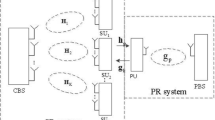Abstract
The problem of joint beamforming and power allocation for cognitive multi-input multi-output systems is studied via game theory. The objective is to maximize the sum utility of secondary users (SUs) subject to the primary user (PU) interference constraint, the transmission power constraint of SUs, and the signal-to-interference-plus-noise ratio (SINR) constraint of each SU. In our earlier work, the problem was formulated as a non-cooperative game under the assumption of perfect channel state information (CSI). Nash equilibrium (NE) is considered as the solution of this game. A distributed algorithm is proposed which can converge to the NE. Due to the limited cooperation between the secondary base station (SBS) and the PU, imperfect CSI between the SBS and the PU is further considered in this work. The problem is formulated as a robust game. As it is difficult to solve the optimization problem in this case, existence of the NE cannot be analyzed. Therefore, convergence property of the sum utility of SUs will be illustrated numerically. Simulation results show that under perfect CSI the proposed algorithm can converge to a locally optimal pair of transmission power vector and beamforming vector, while under imperfect CSI the sum utility of SUs converges with the increase of the transmission power constraint of SUs.





Similar content being viewed by others
References
Scutari, G., Palomar, D. P., & Barbarossa, S. (2008). Cognitive MIMO radio. IEEE Signal Processing Magazine, 25(6), 546–592.
Islam, H., Liang, Y., & Hoang, A. T. (2008). Joint power control and beamforming for cognitive radio networks. IEEE Transactions on Wireless Communications, 7(7), 2415–2419.
Zhang, L., Liang, Y., & Xin, Y. (2008). Joint beamforming and power control allocation for multiple access channels in cognitive radio networks. IEEE Journal on Selected Areas in Communications, 26(1), 38–51.
Wang, F. G., & Wang, W. B. (2010). Sum rate optimization in interference channel of cognitive radio network. IEEE International Conference on Communications.
Jiang, D., Zhang, H., & Yuan, D. (2010). Linear precoding and power allocation in the downlink of cognitive radio networks. IEEE International Conference on Communications, Circuits and Systems.
Li, H., Gai, Y., He, Z., Niu, K., & Wu, W. (2008). Optimal power control game algorithm for cognitive radio networks with multiple interference temperature limits. IEEE Vehicular Technology Conference.
Zhou, P., Yuan, W., Liu, W., & Cheng, W. G. (2008). Joint power and rate control in cognitive radio networks: A game-theoretical approach. IEEE International Conference on Communications.
Scutari, G., & Palomar, D. P. (2010). MIMO cognitive radio: A game theoretical approach. IEEE Transactions on Signal Processing, 58(2), 761–780.
Zhong, W., Xu, Y. Y., & Tianfield, H. (2011). Game-theoretic opportunistic spectrum sharing strategy selection for cognitive MIMO multiple access channels. IEEE Transactions on Signal Processing, 59(6), 2745–2759.
Zhang, L., Liang, Y., Xin, Y., & Poor, H. V. (2009). Robust cognitive beamforming with partial channel state information. IEEE Transactions on Wireless Communications, 8(8), 4143–4153.
Zheng, G., Wong, K., & Ottersten, B. (2009). Robust cognitive beamforming with bounded channel uncertainties. IEEE Transactions on Signal Processing, 57(12), 4871–4881.
Wang, F., & Wang, W. (2010). Robust beamforming and power control for multiuser cognitive radio network. IEEE GLOBECOM.
Shenouda, T. N., & Davidson, M. (2008). On the design of linear transceivers for multiuser systems with channel uncertainty. IEEE Journal on Selected Areas in Communications, 26(6), 1015–1024.
Parsaeefard, S., & Sharafat, A. R. Robust distributed power control in cognitive radio networks. IEEE Transactions on Mobile Computing, published online.
Wang, J., Scutari, G., & Palomar, D. P. (2011). Robust MIMO cognitive radio via game theory. IEEE Transactions on Signal Processing, 59(3), 1183–1201.
Anandkumar, A. J. G., Anandkumar, A., Lambotharan, S., & Chambers, J. A. (2011). Robust rate-maximization game under bounded channel uncertainty. IEEE Transactions on Vehicular Technology, 60(9), 4471–4486.
Parsaeefard, S., Sharafat, A. R., & van der Schaar, M. (2011). Robust equilibria in additively coupled games in communications networks. IEEE GLOBECOM.
Zhao, F., Li, B., & Chen, H. B. (2012). Joint beamforming and power allocation algorithm for cognitive MIMO systems via game theory. 7th International Conference on Wireless Algorithms, Systems, and Applications (WASA’12).
Hamdi, K., Zhang, W., & Letaief, K. B. (2009). Opportunistic spectrum sharing in cognitive MIMO wireless networks. IEEE Transactions on Wireless Communications, 8(8), 4098–4109.
Niyato, D., & Hossain, E. (2008). Competitive spectrum sharing in cognitive radio networks: A dynamic game approach. IEEE Transactions on Wireless Communications, 7(7), 2651–2660.
Kang, G. H., Fan, X. N., & Zhu, C. P. (2011). Distributed beam-forming and power control in multi-relay underlay cognitive radio networks: A game-theoretical approach. 6th International ICST Conference on CROWNCOM.
Chrisanthopoulou, M., & Tsoukatos, K. P. (2007). Joint beamforming and power control for CDMA uplink throughput maximization. IEEE 18th International Symposium on Personal, Indoor and Mobile Radio, Communications.
Boyd, S., & Vandenberghe, L. (2004). Convex Optimization. Cambridge: Cambridge University Press.
Acknowledgments
This research was supported by the National Natural Science Foundation of China (61172055, 61162008), the Guangxi Natural Science Foundation (2013GXNSFGA019004), the Key Project of Chinese Ministry of Education (212131), the Foundation of Department of Education of Guangxi Province (201202ZD045, 201202ZD046), and the Open Research Fund of Guangxi Key Lab of Wireless Wideband Communication & Signal Processing (12103, 12106).
Author information
Authors and Affiliations
Corresponding author
Rights and permissions
About this article
Cite this article
Zhao, F., Li, B., Chen, H. et al. Joint Beamforming and Power Allocation for Cognitive MIMO Systems Under Imperfect CSI Based on Game Theory. Wireless Pers Commun 73, 679–694 (2013). https://doi.org/10.1007/s11277-013-1210-0
Published:
Issue Date:
DOI: https://doi.org/10.1007/s11277-013-1210-0



